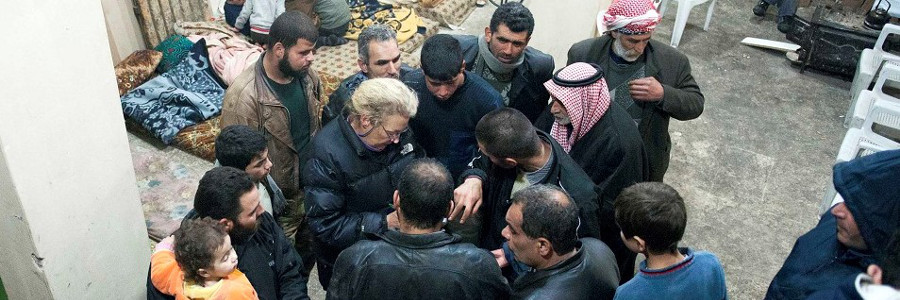Night descends on Beirut as a group of journalists convene in the Foreign Correspondents Club. They’re there to discuss the developing situation in Syria, where President Bashar al-Assad has launched a ruthless attack against citizens in order to suppress a looming revolution.
Many members of the group are hesitant to enter the slaughtering grounds. The danger’s great, and with an illegal border crossing their only means of entering the country, they have little hope of aid should something go wrong.
There’s one journalist, however, who will not be dissuaded. A rugged, passionate professional with an iron will and an iconic eyepatch, Marie Colvin is going to bear witness to the atrocities being committed against the people of Syria no matter what it takes.
Ultimately, it took her life.
Chris Martin’s Under the Wire celebrates Colvin’s dogged pursuit of stories that would open the world’s eyes to injustice through footage taken during her mission, and interviews with friends and colleagues. It’s fascinating to watch the woman many call the most important war correspondent of her time at work, especially when she visits the so-called “Widow’s Basement” for one of the most important pieces she will ever write. Colvin grills her subjects. She sounds almost inconsiderate, the way she demands answers to questions like “so how do you know your husband’s dead?”. It’s ironic, for when you read her work, it’s clear how much love and respect she has for these people, and the truth behind their plight.

Under the Wire is about more than Colvin’s story, however. In a way that draws parallels with her unique reporting style, the documentary uses her presence in the city of Baba Amr as a means of providing greater context for the tales of others striving for justice. There’s Dr. Mohamed, the head of the medical centre whose Youtube videos first put a spotlight on the atrocities committed by the Assad government. Then there’s Wa’el, the resident who agrees to report for The Sunday Times, so long as he doesn’t get paid. He doesn’t want to be associated with the selfish foreign press, he says, though he recognised Colvin as special.
Most important is the insight of Paul Conroy, the photojournalist who accompanied Colvin. Where many of his peers found it hard to work with her (one said she was scarier than the war they were supposed to be covering), Conroy speaks of her reverentially. It’s through him that the audience best understands the situation both journalists and residents faced in Baba Amr, and he doesn’t mince words when he declares that the government explicitly attempted to kill them (in Colvin’s case, successfully) because of the great work they were doing.
An hour in, Under the Wire takes an intense turn. Much of the on-the-scene footage is replaced by stylised b-roll, but that does not make what unfolds any less gripping. The details of this turn won’t be explained here, but suffice it to say that those who are only familiar with the situation through Colvin’s reporting or the feature adaptation of the story, 2018’s A Private War, will be astounded by the new perspective.
Colvin is rarely on screen in Under the Wire. The audience barely even hears her voice. Yet her legacy is felt throughout, carried as it is through the presentation of the documentary, her writing, and the people who surrounded her in her final weeks. That is a testament to the impact she had, and a fitting epilogue to a brilliant life and career.
—
Under the Wire screens as part of ACMI’s Documentary Showcase on March 3rd and 10th. The March 3rd screening will be followed by a Q&A with Producer Tom Brisley.
Click here to book your tickets.
